Custodial staff cleans classrooms and common areas daily
September 2, 2020
Iowa State classrooms and common areas are being cleaned once a day Mondays through Fridays by custodial staff to mitigate surface spread of COVID-19.
Michelle Lenkaitis, a program coordinator for facilities planning and management, said Iowa State does not have the capacity to clean after every class, as there are approximately 165 custodial staff members. New, temporary and term custodians are continually being hired from agencies.
Lenkaitis is in charge of overseeing the cleaning of administrative buildings on campus, such as classrooms, auditoriums, offices, Parks Library and research labs.
“Our regular custodians are assigned to specific buildings, and each of them have schedules of what they’re expected to clean,” Lenkaitis said. “Those schedules might involve daily cleaning, might involve weekly cleaning, might involve monthly cleaning depending on the type of space.”
Classrooms, auditoriums, restrooms and common areas are being cleaned daily, while other spaces without as much foot traffic will be cleaned weekly or monthly. Term custodians are being assigned to classrooms and auditoriums but may also be cleaning restrooms when necessary.
Custodial staff is using concentrated Shurgaurd Plus, a disinfecting agent diluted through chemical dispensers. To properly disinfect, the product must be on a surface for 10 minutes and is then left to air dry. The university is using spray bottles and electrostatic sprayers to distribute the product.
Lenkaitis said janitorial staff is not receiving hazardous duty pay for their work because they are not being put at any risk that Iowa State is aware of, but she also said that doesn’t mean there isn’t any risk at all.
“The [Centers for Disease Control and Prevention] says it’s less likely to get COVID-19 from a surface,” Lenkaitis said. “It’s mainly transmitted through respiration, being close to someone and the aerosols. But it’s an important component of mitigation to make sure we’re keeping services as clean as we can.”
Lenkaitis said custodial staff undergoes training and is given proper personal protective equipment (PPE) before starting their custodial work.
If a person has tested positive and is present in an area for more than 15 minutes, they can create aerosols that potentially infect people around them and contaminate surfaces.
It was recommended to close the space for seven days before custodial staff should go in and clean the area because of lingering aerosols. If a space cannot be vacant for seven days, trained custodial staff goes in after 24 hours and cleans while wearing a gown, gloves and the option to wear a disposable face covering.
Tracking positive students is done through the university’s contact tracing system. If a student receives a positive COVID-19 test, they are directed to give information on where they may have been for significant amounts of time since they tested positive.
Custodial staff are not required to wear PPE everytime they clean, only in areas that have had people with confirmed positive cases present. The custodial staff could potentially get notified of a space that has been impacted by COVID-19, but the notification system does not alert them every single time there is an infected area. Lenkaitis said she does not see this as a risk for her custodial staff.
“If you were tested today and you had been in Bessey Hall auditorium, by the time we would’ve found out that you were in that room, we would have already cleaned and disinfected it probably twice,” Lenkaitis said. “It’s more spaces we’re not in, because we’re not cleaning offices currently, that we would have to be notified.”
Kerry Bittle, custodian for facilities planning and management, cleans Parks Library every weekday from 3 p.m. to 11:30 p.m with seven of her coworkers. Bittle said she has put herself in charge of all 300 garbages in the library, spacing out chairs, wiping off tables and arm rails, all of which takes her 8 hours to complete.
Bittle has been working as a custodian for facilities planning and management for about seven weeks and formerly worked at a nursing home, where she also learned about proper disinfecting methods.
“Who’s checking on us? Nobody,” Bittle said. “Instead of all of us having assigned stuff, we’re a team. It’s awesome that the kids care. Today, [the library] is packed, but it’s only one [person] per table, and they’re not moving their chairs.”
Bittle said her COVID-19 custodial training consisted of watching instructional videos and learning how to use sprayers. Even though there are only seven custodial staff members cleaning the library, she said they have been able to handle it all themselves.
“I thought the building was big, but it took only a couple days for it to feel small,” Bittle said. “I’m not [concerned for my safety]. I’m a person who’s more concerned for others […]. Why am I potentially risking my health for people I don’t know? They’re worth it.”
Melissa Draves, junior in genetics, said she enjoys going to classes in-person but that the risk can sometimes outweigh the benefits. She is on campus five days a week for three different classes.
“As soon as the other class gets out, we go in, and there’s no cleaning between those classes,” Draves said. “[…] It makes me feel a little bit less safe. Personally, for me, I’m not really much at risk if I get the virus, but I would feel awful if I passed it on to anyone else, so I’m taking things very seriously.”
Draves and her three roommates are currently isolating themselves while they await test results from Thielen Student Health Center.
“I think at this point, the data [the New York Times] released last week, it’s honestly kind of ridiculous to me that we haven’t gone online,” Draves said. “There are schools across the country that have way less cases than us that are taking bigger precautions, and it feels like [Iowa State] doesn’t really care about us.”







